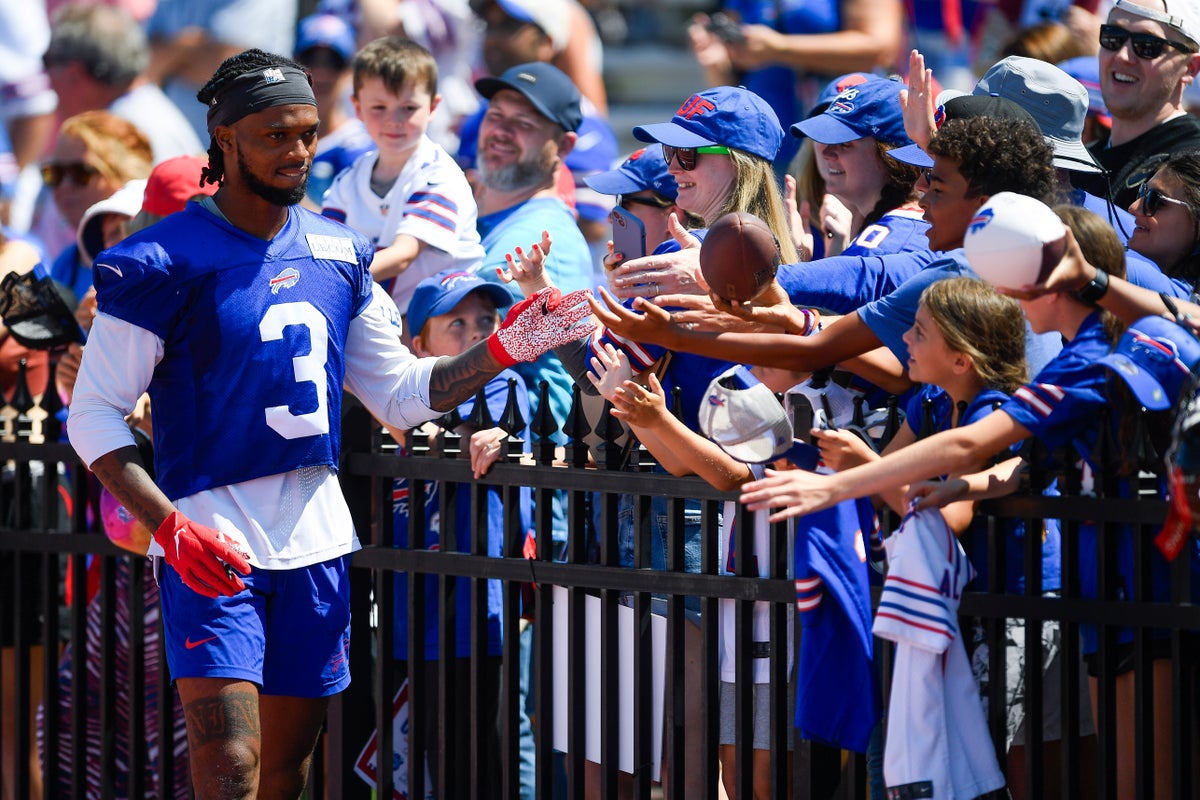
Damar Hamlin will expand his efforts to promote charitable giving by supporting a company that allows donors to give to nonprofits immediately, while actually paying later — the Buffalo Bills safety's latest move to direct the outpouring of support he received after collapsing on the field during a game in January.
Hamlin announced Wednesday that he will be a brand ambassador for the tech platform B Generous, which says its “Donate Now, Pay Later” service yields much higher average donations — more than $750, compared to the average online donation of $128 collected last year.
“The thing about Damar is that when he does something, he’s not surface level,” said Dominic Kalms, CEO of B Generous. “This is something that actually means something to him.”
As part of the partnership agreement, Hamlin received shares of the company, with the option to buy additional shares. A B Generous investor introduced the company to Hamlin, who became interested in its vision, Kalms said.
“He wakes up every morning and tries to think of how he can have a positive effect on the world,” Kalms said. “That’s been my personal mission my whole life. And as we learned how similar we were in so many aspects, this partnership started to really make sense.”
It takes half an hour to embed a “Donate Now, Pay Later” button into a nonprofit's website, Kalms said, and Hamlin plans to offer it to donors to his nonprofit, the Chasing Ms Foundation. The service is free for donors but charges nonprofits a fee, which ranges from a few percentage points to more than 10%, depending on a number of factors.
The fee structure raised concerns for Isis Krause, chief strategy officer of Philanthropy Together, a nonprofit that organizes collective giving circles and provides education for potential donors.
“We’re always in favor of democratization and access to giving whenever possible, but that can’t come at the expense of nonprofits themselves or of questions of equity overall,” she said. Krause pointed to other online giving services that are themselves nonprofits, like Every.org, which has sought to negotiate low transaction fees with major payment processors and also asks donors to tip.
B Generous gives donors the option of covering some of the costs that it charges nonprofits, said Kalms, adding that its fees were comparable to other online giving platforms.
Through its service, B Generous sends a donor's full pledged amount, which must be a minimum of $75, to the nonprofit immediately and allows the donor to claim a tax benefit. Donors can then pay their pledge over three, six or nine months. Essentially, the donor gets a no-interest loan for their pledge.
B Generous runs a soft credit check on potential donors and won't accept people with credit scores of less than 500. It also has a hardship program allowing people to skip or delay payments, though even in that case, the nonprofit will not have to repay any of the pledge. Since it launched publicly in October, the company has not had anyone default, Kalms said.
Dale Pfeifer, CEO of the individual donor support nonprofit Giving Compass and a former philanthropic entrepreneur herself, was amazed B Generous had no defaults until now. She wondered whether that will continue if more people use the service and whether the company will continue to guarantee that no funds will be pulled back from the nonprofit if a donor doesn't fully pay.
The average B Generous donor has an annual income of $120,000, so it's "somebody who can actually afford to give more, but finds the management of their liquidity through this product a very attractive proposition," Kalms said.
Pfeifer applauded the larger-than-average donation size the company reports as a major success but also encouraged B Generous to provide robust education to potential donors to ensure they don't make commitments they can't keep.
“This is really concerning to me, particularly in an industry like philanthropy, where the aim is really to support and uplift people not to inadvertently cause them financial strain,” she said.
Kalms acknowledged the potential for donors to overcommit but said they've taken precautions to prevent "going after people that can’t really afford these donations.”







